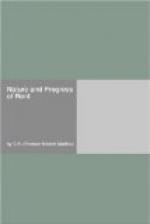Secondly, that quality peculiar to the necessaries of life of being able to create their own demand, or to raise up a number of demanders in proportion to the quantity of necessaries produced.
And, thirdly, the comparative scarcity of the most fertile land.
The qualities of the soil and of its products, here noticed as the primary causes of the high price of raw produce, are the gifts of nature to man. They are quite unconnected with monopoly, and yet are so absolutely essential to the existence of rent, that without them, no degree of scarcity or monopoly could have occasioned that excess of the price of raw produce, above the cost of production, which shows itself in this form.
If, for instance, the soil of the earth had been such, that, however well directed might have been the industry of man, he could not have produced from it more than was barely sufficient to maintain those, whose labour and attention were necessary to its products; though, in this case, food and raw materials would have been evidently scarcer than at present, and the land might have been, in the same manner, monopolized by particular owners; vet it is quite clear, that neither rent, nor any essential surplus produce of the land in the form of high profits, could have existed.
It is equally clear, that if the necessaries of life the most important products of land — had not the property of creating an increase of demand proportioned to their increased quantity, such increased quantity would occasion a fall in their exchangeable value. However abundant might be the produce of a country, its population might remain stationary And this abundance, without a proportionate demand, and with a very high corn price of labour, which would naturally take place under these circumstances, might reduce the price of raw produce, like the price of manufactures, to the cost of production.
It has been sometimes argued, that it is mistaking the principle of population, to imagine, that the increase of food, or of raw produce alone, can occasion a proportionate increase of population. This is no doubt true; but it must be allowed, as has been justly observed by Adam Smith, that ’when food is provided, it is comparatively easy to find the necessary clothing and lodging. And it should always be recollected, that land does not produce one commodity alone, but in addition to that most indispensable of all commodities — food — it produces also the materials for the other necessaries of life; and the labour required to work up these materials is of course never excluded from the consideration.(6)
It is, therefore, strictly true, that land produces the necessaries of life, produces food, materials, and labour, produces the means by which, and by which alone, an increase of people may be brought into being, and supported. In this respect it is fundamentally different from every other kind of machine known to man; and it is natural to suppose, that it should be attended with some peculiar effects.




